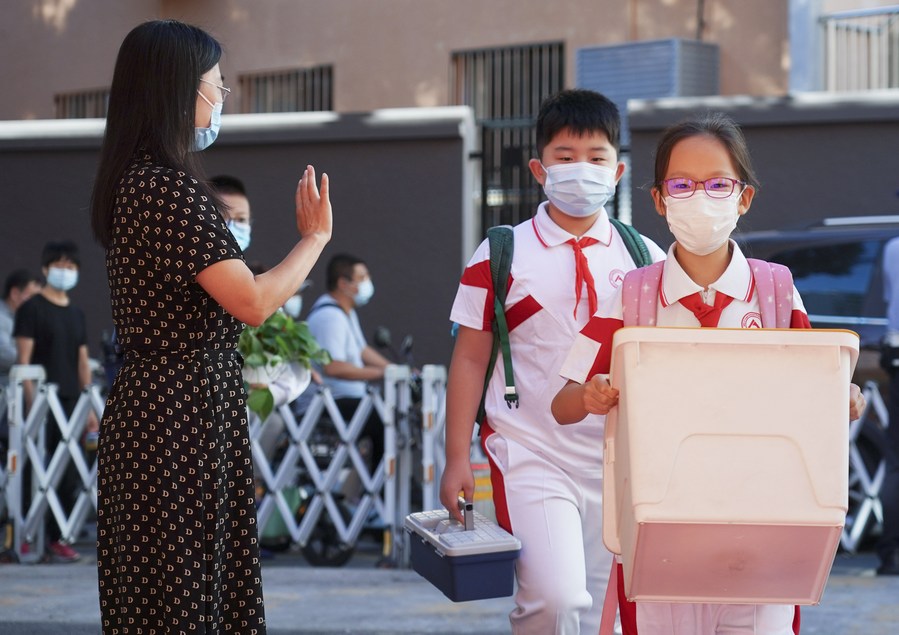New horizons open for students as homework pressures ease

Students arrive at the Experimental Primary School of RDFZ (the High School Affiliated to Renmin University of China) in Haidian District of Beijing, capital of China, Sept. 1, 2022. (Xinhua/Ren Chao)
On Sept.4, many more students than in previous years are wearing broad smiles as they return to school following a relaxing summer break in Beijing.
One year ago, China rolled out the "double reduction" policy to ease the burden of excessive core-subjects homework and off-campus tutoring faced by middle and primary school students.
By cutting the pressure on students brought by homework and off-campus tutoring, the policy not only allows children more time to rest and play, but also allows them to obtain the nutrition needed for their all-around moral, intellectual and physical development.
Positive changes have taken place. Compared with a year ago, students now have more independent, diversified choices of extracurricular activities to explore, and can develop their interests and abilities, which opens up new horizons for them.
To Yue Xinyu, a third-grader in central China's Wuhan City, a notable change is that her primary school classes now finish earlier in the afternoon than before.
"After class, we can opt for various interest-oriented classes and workshops, or stay in the classroom to do homework and read our favorite books," the eight-year-old student said.
Football, basketball, opera classes and clay workshops, among other classes, are available to lower graders, while senior primary students have more choices, including programming and dance.
A dance lover herself, Yue is eager to join the school's club when she becomes old enough. She now takes off-campus Latin dance lessons in her spare time. Gliding on the dance floor makes her feel relaxed and confident, she said.
Gao Fuying, principal of the Xishan High School of Kunming No.1 High School in southwest China's Kunming City, said students now are less likely to be overwhelmed by after-school homework, as teachers have enhanced their classroom teaching efficiency and optimized the design and amount of homework they set.
"Students are happier than before," Gao said.
With less pressure from homework, they have more time for and more choices of extracurricular activities to follow their interests and hobbies, whether on the soccer field or in art classrooms.
Through the changes, Gao sees the essence of education, which is for the all-around development of students.
Gao's school provides students with a variety of free interest-oriented after-school classes, including various kinds of sports, dancing, chorus, fine arts, animation drawing, and cooking.
Following the implementation of the "double reduction" policy, many students from Gao's school won prizes in national, provincial or city-level contests in sports, arts and innovation.
"In sports competitions, our students can even outperform students from schools specializing in sports, and many cannot believe that we are just an ordinary high school," Gao said proudly.
During this summer break, many schools across the country provided daycare services as a move to support the "double reduction" policy.
Among them were dozens of primary schools in the northeastern city of Shenyang, where guided extracurricular programs, including baking, rock climbing, rowing and indoor skiing, attracted many students, bringing fun and joy to school children.
Parents also have their own roles to play -- a demanding role, according to Ding Ning, mother of Yue in Wuhan -- in the "double reduction" context.
With less homework and more free time, children need guidance to make better use of their time, Ding said.
Apart from dancing, Yue is interested in graphical programming and has been learning it from her father for a year in her spare time. Computer programming skills enable her to design images, such as trees and the Great Wall.
"Artificial intelligence and Machine Learning are becoming more and more popular, and we hope our child will have more chances to choose what she likes to do in the future by developing her interest in programming when she is young," she said.








